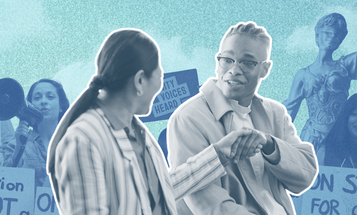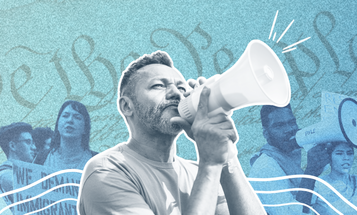
Can Trump "Drain the Swamp"? Will He Try?
Here are five things to watch for from Trump
Millions of Americans pulled the lever for Donald Trump at least in part because they (accurately) perceive that the deck is stacked against them, with government more responsive to the rich and too often putting a thumb on the scale for the already-haves. Trump courted their votes with a populist appeal to “drain the swamp” in Washington, rejecting business-as-usual in the capital which has served elites at the expense of working Americans.
What it means to “drain the swamp,” whether Trump can do it, and if he’ll even try are central questions for the incoming administration.
A set of the nation’s leading political reform organizations have laid out the real solutions that would actually make government accountable to the People and ensure that the strength of all of our voices doesn’t depend upon the size of our wallets. Although the agenda was sent to Trump’s transition team, he has declined to endorse any of its key elements.
Trump’s snapshot of “the Swamp” and promises to fix it
Candidate Donald Trump said that his “campaign is about breaking up the special interest monopoly in Washington, D.C. We’re trying to disrupt the collusion between the wealthy donors, the large corporations, and the media executives. They’re all part of the same rigged political establishment”—a system “rigged by big donors who want to keep down wages.”
He also called Super PACs (which can raise and spend unlimited campaign money) a “disaster” and a “scam” and presented himself as the solution: “The voters in the Republican Party this year defied the donors, the consultants, the power brokers and chose a nominee from outside our failed and corrupt and broken system.”
Trump then promised to crack down on lobbyists, push for term limits, and prevent senior officials from collecting large speaking fees for five years after leaving office.
Trump’s reality so far
Trump’s populist message is attractive to many people. Unfortunately his proposed solutions barely scratch the surface, or could make matters worse.
Yes, lobbyists have too much power, but this isn’t just because of their prior relationships; it’s also because they can bundle huge sums of campaign cash.
Yes, Super PACs are a big problem—but Trump has offered no solution.
And, ironically, term limits for legislators can actually further empower lobbyists because inexperienced officeholders are more dependent upon them.
Nothing about Trump’s transition performance suggests that he’ll stick to even these modest pledges, or take any concerted action to increase Americans’ confidence in our democracy.
He stacked his transition team with lobbyists, before purging them under pressure. Even after this purge, 70 percent of the transition’s “landing team” staff have corporate ties. He flirted with thwarting anti-nepotism laws by appointing his son-in-law to a White House post, before backing off. He has refused to place his business holdings in a blind trust, raising the specter of unprecedented conflicts of interest in the U.S. and around the world, and greatly complicating U.S. foreign policy. He has appointed former FEC commissioner, strict partisan, and ardent money in politics reform opponent Donald McGahn as White House Counsel. And, he has actively undermined confidence in American democracy by making wild and unsubstantiated claims of massive voter fraud.
And, in spite of his professed concern about wages, Trump has shown no appetite for joining workers in fighting for a strong minimum wage or protecting their rights to organize through a union. Instead, he’s hired a Wall Street executive known for foreclosing on working families’ homes (and happened to be in charge of raising money for Trump’s campaign).
What does it mean to really “Drain The Swamp?”
National politics is failing working Americans not just because of cozy relationships and personal conflicts of interest in Washington, but more importantly because our broken system allows the wealthiest one percent to translate its tremendous economic might directly into political power. Wealthy donors do this less by bribing politicians than by filtering the pool of candidates for elected office and then ensuring those candidates hear a distorted take on the nation’s problems when dialing for dollars.
The donor class has starkly different views than the rest of us, especially on core economic issues like paid sick days or a living wage. So when government is more responsive to the wealthy, it skews policy in predictable ways—the reason that working people accurately perceive the system is rigged against them, and one of the reasons Trump’s appeal was powerful.
Banning speaking fees and electing billionaires who can spend their way into office aren’t solutions to this problem: cosmetic changes while putting the wealthy in charge directly won’t curb the power of the one percent.
Eliminating Super PACs so the super-rich can’t drown out the rest of our voices would be a great start. This would require a constitutional amendment or transforming the Supreme Court’s approach to money in politics, neither of which Trump has supported.
We also need to empower all Americans to have a stronger voice over the decisions that affect our lives. The best way to do this is to provide limited public funding for election campaigns. Matching small contributions (like in New York City) or giving everyone “democracy vouchers” (like an innovative program in Seattle) can shift the balance of power from lobbyists to voters.
What to watch for
Over the next weeks and months, here are five key questions a Trump Administration must answer as Americans hold President Trump to candidate Trump’s promises to “drain the swamp”:
1. Will Trump clear up his own ethical problems by divesting all of his business holdings and putting his assets in a blind trust?
2. Will Trump follow through on his own modest proposals to crack down on lobbyists, or will his political appointees be flush with corporate ties and conflicts of interest?
3. Will Trump stand up to Senate Majority Leader (and long time advocate of unlimited campaign spending) Mitch McConnell’s inevitable attempts to undermine the nation’s remaining protections against big money’s power in Washington, or will he work with McConnell to increase the pull of the wealthy and well-connected?
4. Will Trump nominate an open-minded Supreme Court justice who believes We the People have the power to end Super PACs, or an ideologue who will follow the Roberts Court’s current path of destroying common sense protections against big money?
5. Will Trump support the real, bold solutions (such as public funding for federal elections) that would actually “drain the swamp” and build government that is truly of, by, and for the people?



